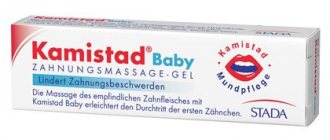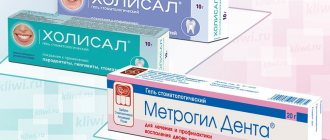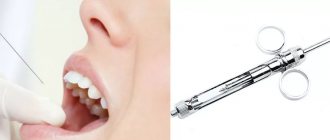Everyone experiences dental disease at some point. But more often, problems with teeth appear in pregnant women. The reasons are increased stress on the body, rapid consumption of calcium reserves necessary for the construction of the baby’s skeletal system. Many medications are prohibited during pregnancy. Doctors know what to do in such a situation. Dentists often prescribe Metrogyl denta to their patients, the instructions for pregnancy state that the drug can be used during the 2nd or 3rd trimester, but with caution.
Description of the drug
Metrogyl Denta is produced by an Indian pharmaceutical company that uses Ayurvedic knowledge when developing its drugs.
The release form of the medicine is a white gel with a faint menthol odor. The basic components of the product are chlorhexidine and metronidazole. Additional components:
- Sodium hydroxide
- Levomenthol
- Saccharin
- Carbopol
- Water
- E 1520.
Metrogyl Denta is an antimicrobial and antiseptic drug. When applied topically, the gel is almost not absorbed and does not penetrate into the general bloodstream.
The antibiotic effectively destroys gram-negative and gram-positive microorganisms. However, the drug does not disrupt the microflora in the mouth. Therefore, the number of lactobacilli does not decrease.
Metrogyl denta is prescribed for the following diseases:
- Periodontitis is inflammation of the periodontium, leading to the appearance of a pocket in the gum and destruction of the bone process
- Gingivitis – occurs due to hormonal imbalance, lack of vitamins in pregnant women
- Aphthous stomatitis - the disease is characterized by the formation of aphthae, the ulcers hurt and take a long time to heal
- Cheilitis – characterized by the formation of ulcerations, crusts, and redness in the corners of the mouth
- Periodontitis – inflammation and suppuration of the periodontium
- Periodontal disease is a lesion of the tissues that fix the tooth, which exposes the neck of the tooth.
Doctors know whether Metrogyl denta gel can be used topically for dental diseases by pregnant women. But contraindications should be taken into account. These are intolerance to components, age under 18 years, diseases of the central nervous system or blood, 1st trimester of pregnancy.
Using Metrogyl may lead to side effects. Often, after using the gel, allergic manifestations and headaches appear.
Instructions for use
In the later stages of pregnancy, the dentist prescribes it when infectious and inflammatory pathologies of the mouth are detected. A woman should not ignore medical recommendations. Any untreated infection will cause symptoms of general intoxication of the body. Such an action will negatively affect the intrauterine growth and development of the fetus and harm the health of the mother.
The duration of therapy recommended during pregnancy in the instructions for use of Metrogyl Denta is 5-14 days. When carrying a child, the drug is prescribed for the shortest possible time and in low doses . This helps minimize the likelihood of side effects. Breastfeeding should be discontinued during treatment with dental gel.
Indications and contraindications
A contraindication to the use of Metrogyl Denta during pregnancy is intolerance to the active or auxiliary ingredients. Also, it cannot be used to prevent gingivitis and other dental pathologies. The gel is prescribed to patients when diagnosing the following periodontal diseases:
- Vincent's ulcerative necrotic gingivitis;
- post-extraction alveolitis;
- acute or chronic periodontitis.
The drug is used to treat cheilitis - inflammation that affects the red border, mucous membrane and skin of the lips. It quickly destroys infectious agents of stomatitis, especially its aphthous form.
Scheme of use during pregnancy
From the second trimester of pregnancy, a thin layer of Metrogyl Dent should be applied to the gums in the morning and evening. The procedure should be carried out only with clean hands using a cotton pad or swab.
After application, you should refrain from eating food and water for 30-40 minutes.
If periodontitis is detected during pregnancy, then Metrogyl Denta gel is used after cleaning the tartar. The dentist will show the woman how to treat a periodontal pocket. In the future, she carries out the procedure independently at home. The average duration of use is 7-10 days.
Side effects
In the second and third trimesters of pregnancy, the use of Metrogyl Denta may cause the development of allergies. Clinically, it manifests itself in the form of small rashes, itching, swelling and redness of the skin.
Is it possible during pregnancy?
Doctors know whether pregnant women can use Metrogyl dent. The product contains an antibiotic, so doctors advise using it with caution.
Metrogyl denta should not be applied to the oral mucosa during pregnancy. But there are a number of cases prohibiting the use of the gel during this period:
- Intolerance to the components of the product
- The development of allergic reactions in the form of itching, nettle fever, headache and rashes.
Recommendations for use boil down to the fact that the medicine can be used topically, applied only to the affected areas of soft tissue. A little gel is squeezed onto a cotton swab and then smeared on the damaged areas.
The procedure is carried out twice a day. After applying the antiseptic, you should not eat for the next 30 minutes. Duration of therapy – 7 days.
If Metrogyl denta is used for periodontitis, then first you need to clean the diseased areas of the gums. The therapeutic effect of the gel lasts about half an hour.
For aphthous stomatitis, treatment lasts up to 10 days. For chronic dental problems, therapy is carried out every year for a course of 7-10 days. The gel can also be used to treat wounds formed after tooth extraction.
Is it possible to use Metrogyl Denta during pregnancy?
Metrogyl Denta is a medicine whose course use helps restore gum health. This ability of the gel is especially in demand during pregnancy. A woman’s body experiences excessive stress due to changes in hormonal levels, which provoke calcium deficiency. And a decrease in immunity often leads to the activation of bacteria belonging to an opportunistic biocenosis. They cause the development of oral pathologies and deterioration of the gums and teeth. Metrogyl Denta successfully copes with all negative symptoms:
- heavy dental plaque;
- redness and swelling of the mucous membranes;
- bleeding even with a light touch;
- burning, stinging and pain during eating.
The dental preparation not only eliminates clinical manifestations, but also affects the cause of the disease - pathogenic microorganisms. Therefore, when asked by pregnant women whether Metrogyl Denta can be used, doctors answer positively. But not during the first trimester of pregnancy, when the formation of the fetus begins.
Potential Harm
During pregnancy, you can use Metrogyl Denta after the end of the first trimester. According to the results of clinical studies, it is safe during this period for the intrauterine development of the fetus. If a woman used the drug for preventive purposes before conception, it is now better to abandon it. Any pharmacological load is undesirable during the period of bearing a child. To prevent the development of gingivitis or periodontitis, you can rinse your mouth with infusions of medicinal herbs:
- chamomile;
- sage;
- oak bark.
In the early stages of pregnancy, the internal organs of the fetus are just beginning to form, the kidneys and stomach are just beginning to function. Metrogyl Denta contains two ingredients that are not antibiotics, but have their properties. Therefore, there is a potential for the development of congenital anomalies.
In the first trimester of pregnancy, you should take any medications only as prescribed by your doctor.
At the first symptoms of gum disease, you should contact your dentist as soon as possible. Treatment of periodontitis or stomatitis at the initial stage is often done without the use of drugs.
Dental prevention during pregnancy
- Treatment of carious teeth and periodontitis before pregnancy.
- Careful dental and oral care. In addition to mandatory brushing of teeth 2 times a day with high-quality toothpaste, it is recommended to use dental floss and rinse to prevent gum disease. You can use gels that restore enamel mineralization, reduce sensitivity and stop caries in the early stages.
- Nutrition should be complete; you can supplement it with vitamin and mineral complexes on the recommendation of the obstetrician-gynecologist who is managing the pregnancy and your trusted dentist.
- Preventive examinations in every trimester. Professional cleaning is usually carried out 2 times a year.
Finding your dentist is no less important than finding a gynecologist. When you trust a specialist, any manipulation will be easy and positive, which will definitely have a positive effect on the health of both mother and child.
Is it possible to treat teeth during pregnancy?
Most likely, the tooth will decay during this time (the bulk of the minerals go to build the fetal body), damage neighboring ones, and also become a source of infection for the newborn. Let's add a change in the properties of saliva, which, due to its increased viscosity, cannot fully wash and protect teeth, and weak mineralization.
The answer is clear: treat. To do this, you need to choose the right time, place, specialist and materials. The specialists at SM-Dentistry treat their patients very carefully and choose only safe treatment methods.
What to pay attention to when treating teeth during pregnancy
Not every doctor will undertake dental treatment during pregnancy. However, an experienced dentist knows what determines the success and safety of treatment.
At what stage of pregnancy should treatment be carried out?
1st trimester (6-12 weeks). Dental treatment is contraindicated. All organs and systems of the baby are formed; the blood-placental barrier is not formed. Manipulation in the oral cavity can lead to the spread of infection and disruption of fetal development. The ban on treatment especially applies to x-ray examinations.
The exception is diseases in which the main symptom is acute pain. Then minimal intervention is performed to alleviate the condition.
The dentist must be informed about pregnancy, possible allergic reactions, and concomitant diseases.
2nd trimester (13-27 weeks). This is the perfect time to deal with your dental problems. During this period, it is good to carry out the following procedures:
- preventive measures, rehabilitation of potential foci of caries or periodontitis. For example, professional teeth cleaning;
- treatment of gingivitis (inflammation of the gums), which often develops due to hormonal changes and leads to bleeding gums.
- treatment of caries using safe modern materials that do not penetrate the placenta.
- tooth extraction. If the tooth is already destroyed and its removal is indicated, then the procedure is carried out as carefully as possible.
3rd trimester (from 28 weeks).
Again we switch to the most gentle mode. Firstly, the risk of premature birth increases. Secondly, sitting in a dentist’s chair, even the most comfortable one, is no longer very comfortable. The load on the cardiovascular system also increases, which can cause fainting, a drop in blood pressure, or, conversely, a sharp increase in blood pressure.
Reviews
Maria, Kursk: I will leave my positive review about Metrogil Denta. In the 3rd trimester of pregnancy, my gums began to swell and bleed. Rinsing the mouth with oak bark and chamomile did not help. But the gel quickly dealt with inflammation and swelling.
Elizaveta, Kislovodsk: In the second trimester of pregnancy, the dentist diagnosed acute gingivitis. I recommended using Metrogyl Denta 2 times a day. After the first application, I was able to eat without feeling pain or burning.











